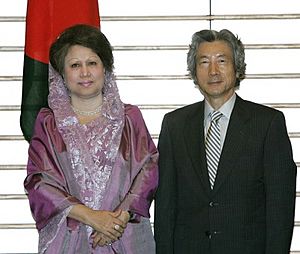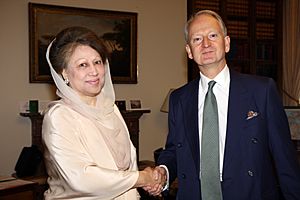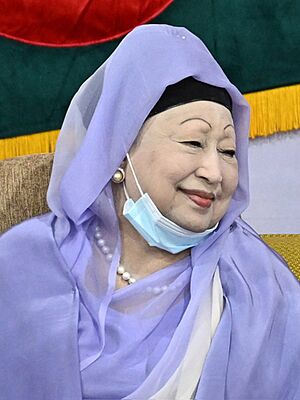Khaleda Zia facts for kids
Quick facts for kids
Khaleda Zia
|
|
|---|---|
|
খালেদা জিয়া
|
|
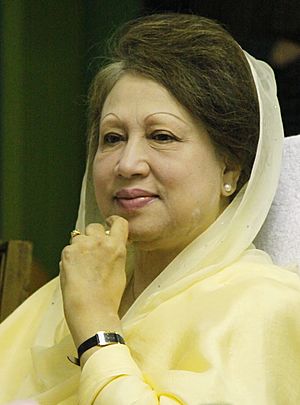
Zia in 2010
|
|
| 9th Prime Minister of Bangladesh | |
| In office 10 October 2001 – 29 October 2006 |
|
| President | |
| Preceded by |
|
| Succeeded by |
|
| In office 20 March 1991 – 30 March 1996 |
|
| President |
|
| Preceded by | Kazi Zafar Ahmed |
| Succeeded by |
|
| 3rd Chairperson of the Bangladesh Nationalist Party | |
| In office 10 May 1984 – 30 December 2025 |
|
| Secretary General |
|
| Preceded by | Abdus Sattar |
| Succeeded by | Tarique Rahman |
| 4th Leader of the Opposition | |
| In office 29 December 2008 – 9 January 2014 |
|
| Prime Minister | Sheikh Hasina |
| Preceded by | Sheikh Hasina |
| Succeeded by | Rowshan Ershad |
| In office 23 June 1996 – 15 July 2001 |
|
| Prime Minister | Sheikh Hasina |
| Preceded by | Sheikh Hasina |
| Succeeded by | Sheikh Hasina |
| 6th First Lady of Bangladesh | |
| In role 21 April 1977 – 30 May 1981 |
|
| President | Ziaur Rahman |
| Preceded by | Sheikh Fazilatunnesa Mujib |
| Succeeded by | Rowshan Ershad |
| 7th Leader of the House | |
| In office 10 October 2001 – 29 October 2006 |
|
| Preceded by | Sheikh Hasina |
| Succeeded by | Sheikh Hasina |
| In office 20 March 1991 – 30 March 1996 |
|
| Preceded by | Kazi Zafar Ahmed |
| Succeeded by | Sheikh Hasina |
| Member of Parliament | |
| In office 29 December 2008 – 9 January 2014 |
|
| Preceded by | Sayeed Iskander |
| Succeeded by | Shirin Akhter |
| Constituency | Feni-1 |
| In office 1 October 2001 – 29 October 2006 |
|
| Preceded by | Zafar Imam |
| Succeeded by | Muhammad Jamiruddin Sircar |
| Constituency | Bogra-6 |
| In office 20 March 1991 – 15 July 2001 |
|
| Preceded by | Zafar Imam |
| Succeeded by | Sayeed Iskander |
| Constituency | Feni-1 |
| Personal details | |
| Born |
Khaleda Khanam Putul
15 August 1945 Jalpaiguri, Bengal Province, British India |
| Died | 30 December 2025 (aged 80) Dhaka, Bangladesh |
| Nationality |
|
| Political party | Bangladesh Nationalist Party |
| Other political affiliations |
|
| Spouse | |
| Children |
|
| Relatives | See Majumder–Zia family |
| Awards | Full list |
| Signature | |
Khaleda Zia (born 15 August 1945 – died 30 December 2025), also known as Begum Khaleda Zia, was an important politician in Bangladesh. She served as the prime minister of Bangladesh twice, from 1991 to 1996 and again from 2001 to 2006. She was the first female prime minister of Bangladesh. She was also the second female prime minister in the Muslim world, after Benazir Bhutto.
Khaleda Zia was the wife of Ziaur Rahman, who was a former president and army commander of Bangladesh. She led the Bangladesh Nationalist Party (BNP) from 1984. Her husband founded this party in 1978.
She first became well-known as the First Lady of Bangladesh when her husband became president in 1977. After his death in 1981, Khaleda Zia entered politics. She became the leader of the BNP. She helped lead the movement for democracy after a military takeover in 1982. She became prime minister after her party won the 1991 election. She served again from 2001 to 2006. After her time as prime minister, she faced legal challenges. She was released from detention in 2020 for medical reasons. She was later acquitted in several cases. Khaleda Zia passed away on 30 December 2025 after a long illness.
Contents
Early Life and Family Background
Khaleda Khanam "Putul" was born in 1945 in Jalpaiguri, which was then part of British India. This area is now in West Bengal, India. Her family was Bengali Muslim. Her father, Iskandar Ali Majumder, was a tea businessman from Feni District. Her mother, Taiyaba Majumder, was from Chandbari village.
After the Partition of Bengal in 1947, her family moved to Dinajpur in East Bengal, Pakistan. Khaleda described herself as "self-educated." She attended Dinajpur Missionary School and later Dinajpur Girls' School.
In 1960, she married Ziaur Rahman, who was a captain in the Pakistan Army at the time. After marriage, she changed her name to Khaleda Zia. She moved to West Pakistan in 1965 to be with her husband. In 1969, they moved back to East Pakistan. Her husband's army postings led the family to move to Chittagong.
Her Children and Relatives
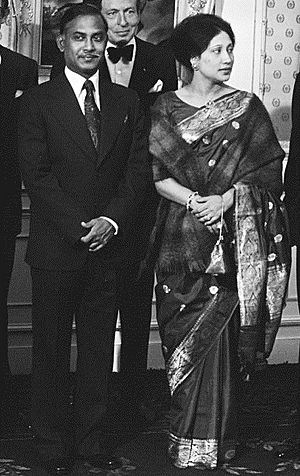
Khaleda Zia had two sons. Her first son, Tarique Rahman (born 1967), became involved in politics. He is now the acting chairman of the Bangladesh Nationalist Party. Her second son, Arafat Rahman "Koko" (born 1969), passed away in 2015.
Her sister, Khurshid Jahan (1939–2006), served as the Minister of Women and Children Affairs from 2001 to 2006. Her younger brother, Sayeed Iskander (1953–2012), was also a politician. He was a member of the Jatiya Sangsad (parliament) from 2001 to 2006.
Role in the Bangladesh Liberation War
In May 1971, during the Bangladesh Liberation War, Zia traveled to Dhaka with her two young children. She stayed with her sister's family. However, Pakistani soldiers soon found out her location. This led to her family moving from house to house to stay safe.
On 2 July 1971, Pakistani forces arrested Zia and her children. They were held in the old Parliament building. Later, they were moved to a house inside the Dhaka Cantonment. She remained detained there until early December 1971. She was finally released on 16 December, the day the Pakistani Army surrendered.
After her release, Zia and her sons were flown to Sylhet. This was arranged by General Arora at her husband's request. They later joined Ziaur Rahman at Comilla Cantonment. In 1977, her husband became the country's president. Zia then served as the First Lady of Bangladesh. On 30 May 1981, her husband, Ziaur Rahman, was assassinated. After his death, she joined the Bangladesh Nationalist Party (BNP) in 1982. Her husband had founded this party.
Leading the Movement for Democracy
In March 1982, the head of the Bangladesh Army, Hussain Muhammad Ershad, took control of the government. This started a nine-year period of military rule in Bangladesh.
Protesting Military Rule
Khaleda Zia immediately spoke out against military rule. She became a senior leader of the BNP by May 1983. Under her leadership, the BNP worked with six other parties. They formed a '7-party alliance' in September 1983. This alliance aimed to protest against Ershad's government.
On 30 September 1983, Zia led a large public rally. She was cheered by her party supporters. On 28 November 1983, she joined a protest around the Secretariat building in Dhaka. Police stopped the protest, and she was placed under house arrest.
In January 1984, Zia became the chairperson of the BNP. She then led the movement against Ershad. In 1984, she called for a 'Demand Day' and 'Protest Day'. Rallies were held across the country. Some activists died during clashes with police.
The protests continued in 1985. As a result, Ershad's government increased martial law. Zia was again placed under house arrest.
Boycotting the 1986 Election
To ease political pressure, Ershad announced a new election for 1986. Zia declared this election illegal. She urged people not to participate. She was placed under house arrest just before the election.
Her strong stand against the military government made her known as an "uncompromising leader." People admired her for standing up to oppression. She refused to participate in any election while Ershad was in power. This greatly increased her popularity.
The Fall of Ershad's Government
Zia was placed under house arrest many times between 1986 and 1990. She continued to lead protests to remove Ershad from power. In 1986, she called for a strike. She was again put under house arrest.
In 1990, the student wing of the BNP, Chatra Dal, gained much popularity. They won many student union elections. This led to new protests to overthrow Ershad. On 10 October 1990, a student leader died in clashes. This brought all opposition groups together.
After two months of protests, the BNP, led by Zia, and other parties forced Ershad to resign. He stepped down on 4 December 1990.
Serving as Prime Minister
Khaleda Zia served as the Prime Minister of Bangladesh three times. Her first term was from March 1991 to February 1996. Her second term was short, lasting a few weeks in 1996. Her third term was from October 2001 to October 2006. She is remembered for making education more accessible and for introducing important economic changes.
First Term (1991–1996)
After eight years of military rule, elections were held on 27 February 1991. The BNP won 140 seats. On 20 March 1991, Zia became the country's first female prime minister. The acting president gave her many powers. This effectively brought Bangladesh back to a parliamentary system. In August 1991, parliament formally ended 16 years of presidential rule.
Improving Education
When Zia became prime minister in 1991, children in Bangladesh received about two years of education. For every three boys, only one girl was in school. Zia worked hard to promote education and job training. Her government made primary education free and required for all children. Education was also made free for girls up to the 10th grade.
To support these changes, the education budget was increased by 60% in 1994. This was the largest increase among all budget areas. These policies led to a big improvement in student pass rates.
Boosting the Economy
Zia's first government introduced major economic changes. These included a new value-added tax (VAT). They also created new laws for banks and financial institutions. A board was established in 1993 to help privatize state-owned businesses. Bangladesh also joined the General Agreement on Tariffs and Trade in 1993.
A new export processing zone was created near Dhaka in 1993. This helped attract foreign companies to invest in Bangladesh.
Administrative Changes
To meet public demand, Zia's government passed a law. This law allowed city mayors to be directly elected by voters. Before this, mayors were chosen by elected ward councillors.
Zia's government also changed the local government system in November 1991. They created a commission to review the structure. This commission suggested a two-level system of local government.
Second Term and Defeat (1996)
In February 1996, most opposition parties boycotted the election. Zia's party, the BNP, won many seats. Other major parties wanted a neutral government to oversee elections. The parliament quickly passed an amendment to create a caretaker government. The parliament was then dissolved for new elections within 90 days.
In the June 1996 elections, the BNP lost to Sheikh Hasina's Awami League. The BNP won 116 seats. It became the largest opposition party in Bangladesh's parliamentary history.
Third Term (2001–2006)
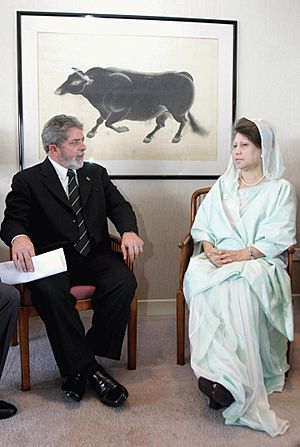
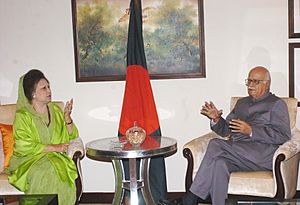
The BNP formed an alliance with three other parties on 6 January 1999. This was to improve their chances in the next elections. The alliance included the Jatiya Party and some Islamic parties.
The four-party alliance won the 1 October 2001 general elections. They secured two-thirds of the seats in parliament. Khaleda Zia was sworn in as Prime Minister again.
She worked on a 100-day plan to fulfill her election promises. During this time, Bangladesh attracted more international investment. This helped develop infrastructure, energy, and businesses. Her government also worked to improve law and order.
Zia promoted good relations with neighboring countries. She worked to strengthen regional cooperation in South Asia. Her government also supported the UN Charter of Human Rights. Bangladesh began to take part in United Nations peacekeeping missions. In 2006, Forbes magazine praised her government's achievements. Her administration worked to educate young girls and provide food for the poor. Her government also supported strong economic growth.
During Zia's third term, Bangladesh's economy grew significantly. The country's income per person increased. Foreign exchange reserves also grew. Foreign investments reached 2.5 billion dollars. The industrial sector of the economy also saw strong growth.
Zia's term ended on 29 October 2006. A caretaker government was set up to manage the country before new elections. However, political unrest caused delays. The military then supported the caretaker government for a longer period. New elections were held in December 2008.
Overall, the BNP's time in power from 2001 to 2006 saw good growth in the economy. Many people were lifted out of poverty. Bangladesh became an important economic force in South Asia.
After Her Premiership (2006–2025)
Facing Legal Challenges
After her time as prime minister, Khaleda Zia faced legal challenges. In March 2007, her eldest son, Tarique Rahman, was arrested. Her other son, Arafat Rahman (Coco), was also arrested in April.
On 3 September 2007, Zia was arrested. She was held in a temporary prison on the parliament building grounds. She was released on bail on 11 September 2008, after about a year of detention.
In December 2008, new general elections were held. Zia's party lost to the Awami League. Sheikh Hasina became prime minister. Zia then became the opposition leader in parliament.
Moving from the Cantonment House
Zia's family had lived for 38 years in a house in Dhaka Cantonment. This was her husband's official residence when he was in the army. After he became president, he kept the house. Following his death, the house was leased to Zia for life.
On 20 April 2009, Zia received a notice asking her to leave the house. The notice stated that she was conducting political activities from the house. It also mentioned that a civilian could not have a residence inside a cantonment. Zia moved out of the house on 13 November 2010. She then moved to her brother's home in Gulshan.
International Engagements
- Saudi Arabia: In August 2012, Zia visited Saudi Arabia. She met with the Saudi crown prince and defense minister. They discussed strengthening ties between the two countries. She also worked to improve opportunities for Bangladeshi workers in Saudi Arabia.
- People's Republic of China: She visited China in October 2012. She met with Chinese leaders, including then Vice President Xi Jinping. Talks focused on trade and potential Chinese investments in Bangladesh. They also discussed financing for the Padma Bridge.
- India: On 28 October 2012, Zia visited India. She met with President Pranab Mukherjee, Prime Minister Manmohan Singh, and other officials. Discussions covered trade and regional security. This visit was important because her party had sometimes been seen as less friendly to India than its rival. Zia stated that her party wanted to work with India for mutual benefit. This included fighting against extremism.
Boycotting the 2014 Election
Zia's party decided not to participate in the 2014 Bangladeshi general election. They demanded that the election be held under a nonpartisan caretaker government. However, Prime Minister Sheikh Hasina rejected this demand. The Awami League won the election.
In 2016, the BNP announced its new National Standing Committee. Zia remained its chairperson.
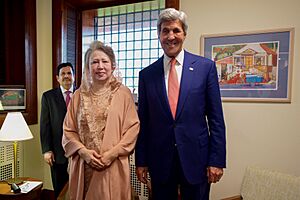
In 2017, police searched Zia's house for certain documents.
Legal Cases and Acquittals
Khaleda Zia faced several legal cases after her premiership. She was held for a period starting in 2018. Due to these legal reasons, she was unable to run in the 2018 Bangladeshi general election. Her party lost that election.
Zia was admitted to Bangabandhu Sheikh Mujib Medical University for medical treatment on 1 April 2019. Her requests for bail were denied multiple times.
On 25 March 2020, Zia was released from prison for six months. This was on humanitarian grounds. She was required to stay at her home and not leave the country. Her release term was extended several times.
After the government led by Sheikh Hasina was removed in 2024, Zia was acquitted in several cases. On 27 November 2024, Zia was acquitted in the Charitable Trust and Barapukuria cases. On 15 January 2025, she was acquitted in the orphanage trust case.
Release in 2024
After Sheikh Hasina was removed as prime minister during the 2024 non-cooperation movement, President Mohammed Shahabuddin ordered Zia's release on 5 August. Soon after, she made her first public statements since 2018. She praised "the brave people" who fought for change. She also urged for "love and peace" to rebuild Bangladesh. On 13 August, her police escort privileges were restored. These had been removed in 2015. On 19 August, Zia's bank accounts, which had been frozen since 2007, were unblocked.
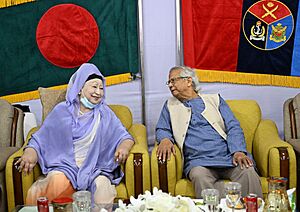
Illness and Death
Khaleda Zia suffered from several health issues since 2021. These included chronic kidney conditions, liver diseases, and diabetes. In April 2021, she also contracted COVID-19, but she recovered without symptoms. On 28 November 2021, doctors announced she had liver cirrhosis. She received treatment at Evercare Hospital in Dhaka multiple times.
On 7 January 2025, Zia traveled to London for medical treatment. She was admitted to The London Clinic the next day.
On 23 November 2025, Zia was hospitalized again in a very critical condition at Evercare Hospital Dhaka. On 1 December 2025, the government declared her a VVIP. The Special Security Force was deployed for her security. On 30 December 2025, the BNP announced that Khaleda Zia died due to her prolonged illness at Evercare Hospital.
Reactions to Her Passing
The country’s interim leader, Muhammad Yunus, expressed "profound sorrow" at her death. He declared three days of state mourning. Indian Prime Minister Narendra Modi said he was "deeply saddened" and offered his "sincerest condolences." Pakistan’s Prime Minister Shehbaz Sharif also expressed deep sadness. He described Zia as a "committed friend of Pakistan." The US embassy in Dhaka extended its deepest condolences.
Electoral History
| Year | Constituency | Party | Votes | % | Result | |
|---|---|---|---|---|---|---|
| 1991 | Bogra-7 | BNP | 83,854 | 66.9 | Won | |
| Dhaka-5 | 71,266 | 51.5 | Won | |||
| Dhaka-9 | 55,946 | 60.4 | Won | |||
| Feni-1 | 36,375 | 38.7 | Won | |||
| Chittagong-8 | 69,422 | 52.1 | Won | |||
| June 1996 | Bogra-6 | 1,36,669 | 58.9 | Won | ||
| Bogra-7 | 1,07,417 | 72.1 | Won | |||
| Feni-1 | 65,086 | 55.6 | Won | |||
| Lakshmipur-2 | 59,054 | 51.6 | Won | |||
| Chittagong-1 | 66,336 | 48.2 | Won | |||
| 2001 | ||||||
| Bogra-6 | 2,27,355 | 78.6 | Won | |||
| Bogra-7 | 1,47,522 | 79.0 | Won | |||
| Khulna-2 | 91,819 | 57.8 | Won | |||
| Lakshmipur-2 | 1,23,526 | 72.2 | Won | |||
| Feni-1 | 1,03,149 | 72.2 | Won | |||
| 2008 | ||||||
| Bogra-6 | 1,93,792 | 71.6 | Won | |||
| Bogra-7 | 2,32,761 | 71.2 | Won | |||
| Feni-1 | 1,14,482 | 65.4 | Won | |||
| Source: | ||||||
Awards and Honours
- On 24 May 2011, the New Jersey State Senate honored Zia as a "Fighter for Democracy." This was the first time the state Senate had honored a foreign leader in this way.
- On 31 July 2018, the Canadian Human Rights International Organization (CHRIO) gave her the "Mother of Democracy" award.
Places Named After Her
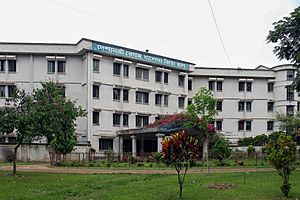
- Begum Khaleda Zia Hall, a residential hall at Islamic University, Kushtia.
- Deshnetri Begum Khaleda Zia Hall, a residential hall at the University of Chittagong.
- Begum Khaleda Zia Hall, a residential hall at Jahangirnagar University.
- Begum Khaleda Zia Hall, a residential hall at the University of Rajshahi.
See also
 In Spanish: Jaleda Zia para niños
In Spanish: Jaleda Zia para niños
 | Victor J. Glover |
 | Yvonne Cagle |
 | Jeanette Epps |
 | Bernard A. Harris Jr. |


